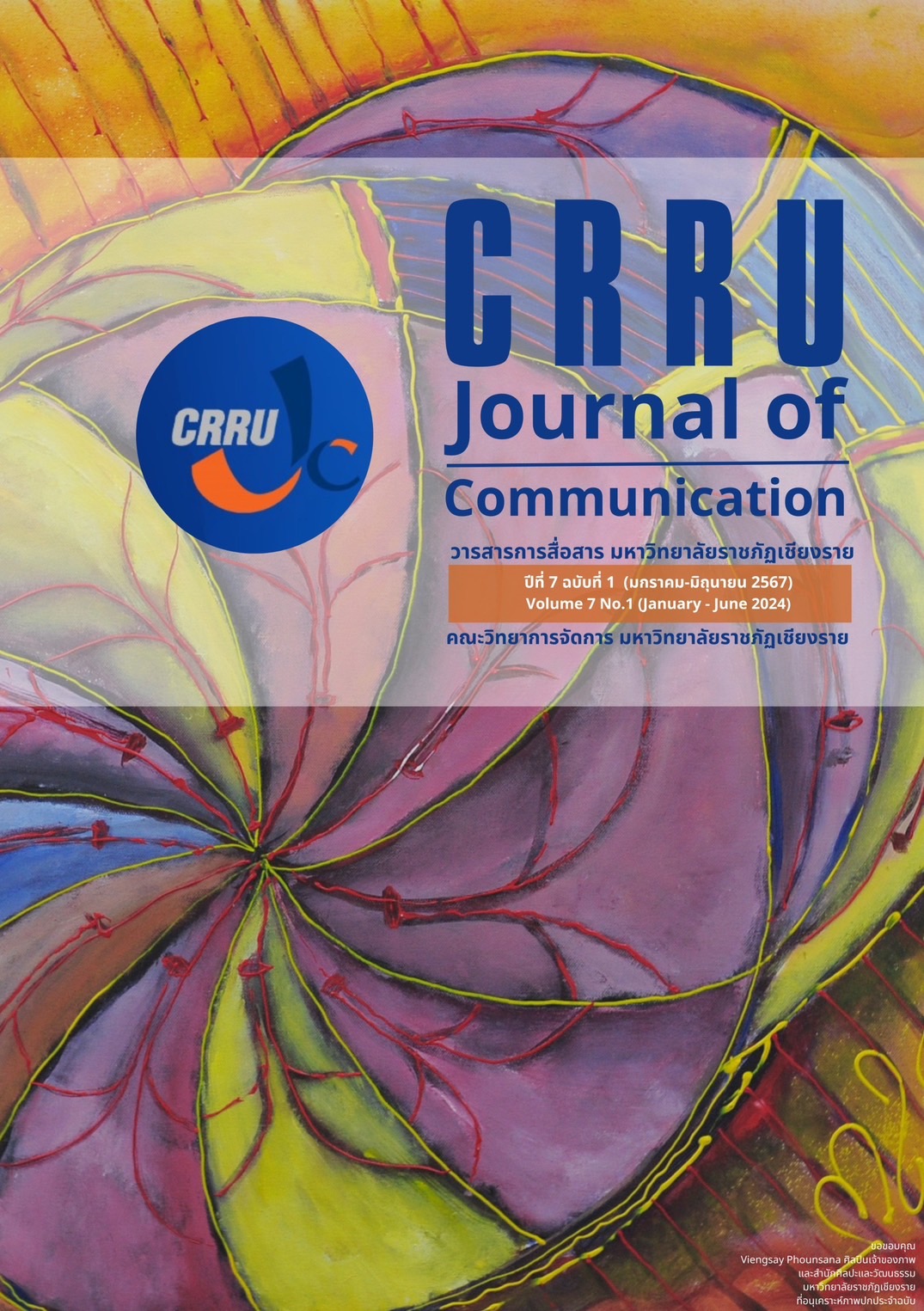A Structural Equation Model of factors that Influencing on Word of Mouth Intention for Prospective Graduate Students at Private Universities
Main Article Content
Abstract
The study is to analyze a structural equation model of factors that influencing on word of mouth intention for prospective graduate students at private universities. The sample was graduates with a graduate degree of less than 2 years and graduate students in the academic year 2023 of five private universities having top amount of students. Four hundred students were selected by a multi-step sample selection, consisting of specific sampling and sample selection based on probability theory. The research tools by used questionnaires. The methods of analysis are descriptive statistics, including mean and standard deviation. and inferential statistics, including Structural Equation Modeling Analysis. The research model is consistent with empirical data. with index value Chi-square/df is equal to 4.907, P-value is equal to 0.06, RMSEA is equal to 0.022, GFI is equal to 0.958, CFI is equal to 0.985 and NFI is equal to 0.982. The research models are consistent with the empirical data.
The results showed that: 1. Organizational universities factors have a direct effects on satisfaction. 2. Organizational universities factor have a direct effects on word of mouth intention and satisfaction indirect influence on word of mount as transmission variable. 3. Perception of corporate brand value factor has a direct effect on satisfaction. 4. Corporate brand value recognition factors have a direct effect on word of mouth intention. and 5. Satisfaction factor has a direct effect on word of mouth intention.
Article Details
References
นภาพร ขันธนภา, มนตรี พิริยะกุล, เกรียงศักดิ์ ขันธนภา และ สุมาลี รามนัฏ. (2560). อิทธิพลคุณค่าตราสถาบันในฐานะปัจจัยตัวแปรคั่นกลางที่เชื่อมโยงความมีชื่อเสียงต่อผลกระทบด้านพฤติกรรมการเลือกเข้าศึกษาในสถาบันอุดมศึกษาเอกชน. วารสารมหาวิทยาลัยศิลปากร, 36(3), 187-208.
บัญชา ศรีสมบัติ. (2565). ปัจจัยที่มีผลต่อการจัดกลุ่มการเลือกเข้าศึกษาต่อระดับปริญญาตรี คณะวิทยาศาสตร์และเทคโนโลยี มหาวิทยาลัยราชภัฏพิบูลสงคราม. วารสารวิจัยและพัฒนา มหาวิทยาลัยราชภัฏพิบูลสงคราม, 16(2), 188-200.
ราชบัณฑิตยสถาน. (2554). พจนานุกรมฉบับราชบัณฑิตยสถาน. กรุงเทพฯ: สำนักพิมพ์อักษรเจริญทัศน์.
สำนักงานคณะกรรมการการอุดมศึกษา. (2567). ข้อมูลสถาบันอุดมศึกษา.รายงานจำนวนนักศึกษาทั้งหมดปีการศึกษา 2561-2566 จำแนกตามประเภทสถาบัน/ชื่อสถาบัน/ชื่อคณะ/ชื่อหลักสูตร ระดับการศึกษา และ เพศ. สืบค้นจาก http://www.info.mua.go.th/info/index_user.php.
อิศราภรณ์ ขวัญใจ. (2562). ปัจจัยที่มีอิทธิพลต่อทัศนคติและแนวโน้มการศึกษาต่อมหาวิทยาลัยเอกชนขนาดใหญ่ในกรุงเทพมหานครและปริมณฑลของนักศึกษาปริญญาตรี. (บริหารธุรกิจมหาบัณฑิตสาขาวิชาการตลาด).มหาวิทยาลัยศรีนครินทรวิโรฒ. กรุงเทพฯ.
Aaker, D., & Joachimsthaler, E. (2012). Brand Leadership. New York: Simon and Schuster.
Aaker, D. A. (1992). The value of brand equity. Journal of business strategy, 13(4), 27-32.
Curran, P.J., West, S.G., & Finch, J. (1996). The robustness of test statistics to non- normality and specification error in confirmatory factor analysis. Psychological Methods, 1, 16-29.
Kotler, P., & Keller, K. (2009). Marketing Management (8th ed.). New Jersey: Prentice Hall.
Kotler, P., & Keller, K. (2014). Marketing Management (15th ed.). New Jersey: Prentice Hall.
Kotler, P., & Armstrong, G. (2020). Principles of Marketing (18th ed.). Boston: Pearson.
Hair, J.F., Black, W.C., Babin, B.J., & Anderson, R.E. (2010). Multivariate data analysis: A global perspective. New Jersey: Pearson Education.
Hair, J.F., Black, W.C., Babin, B.J. and Anderson, R.E. (2014). Multivariate data analysis (7th ed.). New Jersey: Pearson Education.
Rasheed, R., & Rashid, A. (2023). Role of service quality factors in word of mouth through student satisfaction. Kybernetes, 12(8), 102-128.
Schlesinger, W., Cervera-Taulet, A., & Wymer, W. (2023). The influence of university brand image, satisfaction, and university identification on alumni WOM intentions. Journal of Marketing for Higher Education, 33(1), 1-19.
Stewart, V. (2012). A world-class education: Learning from international models of excellence and innovation. Virginia: ASCD.
Sweeney, J. C., Soutar, G. N., & Mazzarol, T. (2008). Factors influencing word of mouth effectiveness: receiver perspectives. European journal of marketing, 42(3/4), 344-364.
Yamane, T. (1973). Statistics an introductory analysis. New York: Harper & Row.


